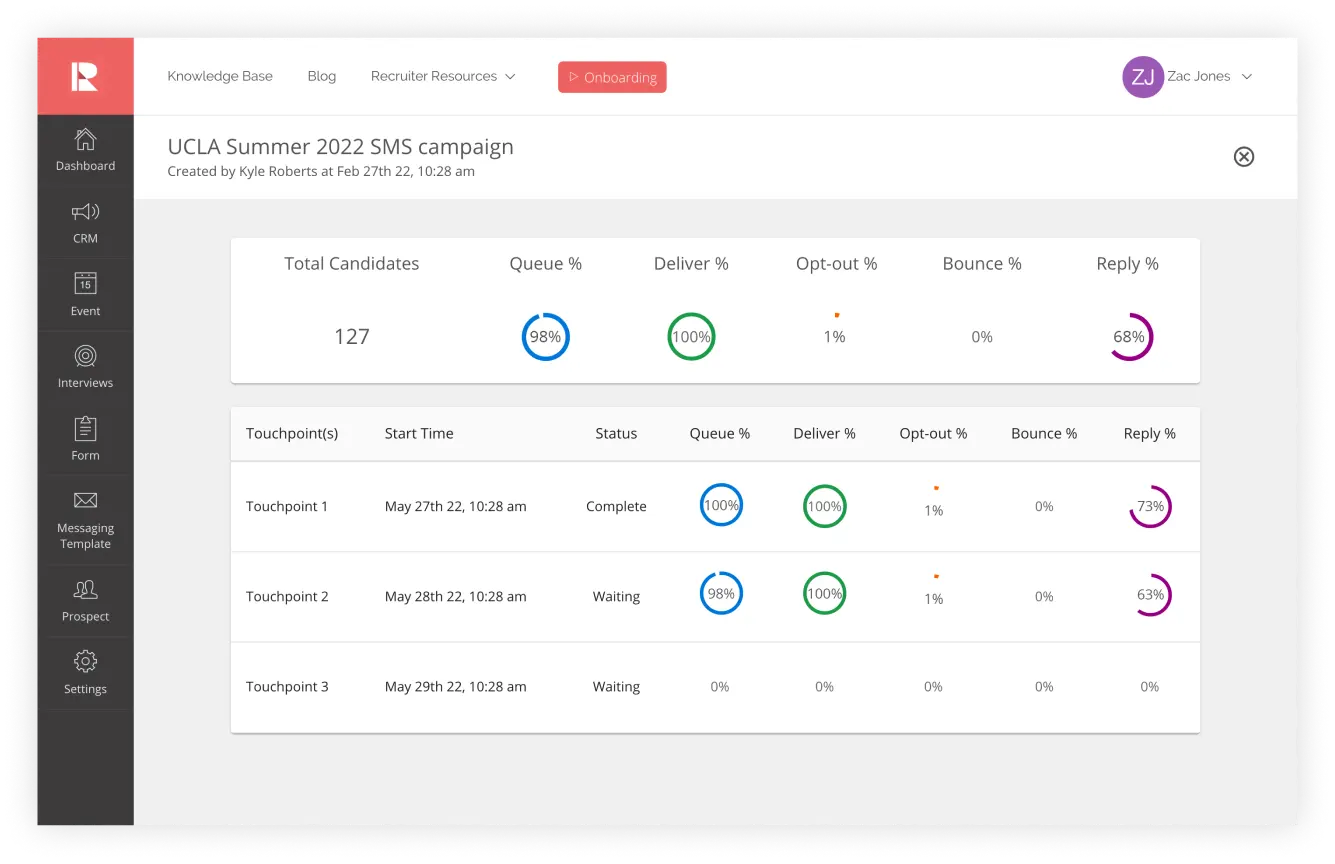SMS Recruiting Laws Every Recruiter Should Know
It’s time to pull out your best pitch and get ready for a text recruiting campaign! Do you know that businesses that focus and optimize their omnichannel recruitment and marketing can gain up to a 9,5% annual revenue growth? So if your recruiting team is looking to expand your reach with SMS recruiting, now’s the time to do it.
However, with the popularity boom of cellphones and smartphones comes the laws to govern their operation. Breaking them can bring dire consequences. To conduct legally compliant SMS recruiting campaigns, let’s dive into some of the most common text recruiting laws.
Why Should You Not Violate Texting Laws?

Each country has its version of text messaging laws. However, keen readers will notice that most of them revolve heavily around the concept of ‘User Consent.’
- The Telephone Consumer Protection Act (TCPA) and the Cellular Telecommunications Industry Association (CTIA) guidelines govern all marketing SMS operations in The US.
- For Canada, it’s Canada’s Anti-Spam Legislation (CASL).
- The EU General Data Protection Regulation (GDPR) covers commercial SMS activities for EU countries and the UK.
The core mission for these regulations is always the protection of individuals from unwanted text messages. To this end, businesses are advised to operate within the law parameters that govern their areas, else suffer damaging consequences. Here are a few reasons why you should not break these laws.
Expensive Consequences
As dictated by the TCPA, a business will have to pay up to $500 per violation of a single offense. This amount could increase up to $1500 if a company violated the law willfully. The fine could increase exponentially if that business committed the same mistakes for every lead. The cherry on top when it comes to TCPA is that the law allows for “uncapped statutory damages,” which only worsen the penalty.
Case in point: a telephone marketing campaign for the movie “Last Ounce of Courage” was subjected to a class-action lawsuit in 2014 due to violating the TCPA. The case was closed in 2017, with the plaintiffs awarded $32.4 million.
It Damages a Business’s Public Image
This one is a no-brainer when it comes to law violations. Whether it is the TCPA, CASL, or the GDPR that governs EU countries, these text marketing and recruiting laws are here to protect the public from the harmful practices of various businesses. An individual can miss an important government announcement because they were smarmed with telemarketing calls or SMSes at the time.
The appearance of the COVID-19 pandemic is keeping the enforcers of these telemarketing laws on edge. Preying on the fear of the Pandemic and relating problems such as the need for vaccines or job shortages, cases of SMS spamming and fraudulent actions through scamming links have rocketed.
So, if a company violated telemarketing laws during their campaign, they are not likely to gain any leads at all. They are bothering their candidates, after all.
Getting to Know the Telemarketing & SMS Recruiting Laws in Your Area

The Telephone Consumer Protection Act
Suppose you are a business operating telemarket operations in The US. In that case, you will be under the watch of The Telephone Consumer Protection Act (TCPA) and the Cellular Telecommunications Industry Association (CTIA).
In 1991, the US Congress enacted the TCPA. At this time, the act’s core mission was to restrict the usage of an auto-dialing system and pre-recorded messages.
The 2015 Declaratory Ruling confirms it is a good start for rules encompassing SMS recruiting & marketing activities as this form of communication became popular. The key takeaways are:
- Telephone service providers can assist users in blocking robocalls.
- It is prohibited for telemarketers to use automated solutions such as robocalls or auto SMS to contact wireless phones and leave pre-recorded messages without consent.
- Consent will remain even if a user ports their landline to a wireless carrier or a cell phone number.
- There are “urgent circumstances” that allow a telemarketer to send messages or call without prior consent, such as fraud alerts or reminders relating to medical reasons. However, companies that perform said actions must also include a clear option to “reply-stop,” “opt-out,” or “unsubscribe,” along with the instruction to do so and a confirmation message after the user opts out.
Cellular Telecommunications Industry Association
The Cellular Telecommunications Industry Association (CTIA) is a trade association representing wireless carriers and other businesses operating in the mobile space of The US. They are the Short Code System and Registry’s creators – a popular method of sending marketing SMSes to consumers.
As part of this Short Code System, the CTIA also provides best practices and guidelines for businesses to follow. If you are already familiar with the TCPA regulation, you will have no problem understanding and complying with the CTIA guidelines. Here are the key takeaways:
- A business can only start auto-texting or robocalling their candidates if they have received express consent to do so from the candidate.
- CTIA suggests asking or taking candidates’ consent through mechanisms including, but not limited to:
- Entering a number after a dial-up message asking for consent
- Entering their email/phone number on said business’s website
- Opt-in using Interactive Voice Response
- The consent is strictly limited to the campaign and the candidates/message receiver it is intended to.
- An Opt-in is successful when a candidate texts your number.
- The opt-out procedure remains similar to the TCPA.
Canada’s Anti-Spam Legislation

Welcome to one of the strictest sets of telemarketing laws in Canada. Introduced by the Canadian government in July 2014, CASL controls the activities related to digital communication in the country. The core mission of CASL is to protect Canadian citizens from spam commercial electronic messages (CEM) while pushing businesses to provide value through each CEM campaign and remain competitive in the global market.
The critical feature of CASL requires businesses operating under this law to have valid written consent from their candidates. Quite similar to the TCPA of The US, right?
It is no mere coincidence, however. The Competition Burrow and The Office of the Privacy Commissioner (CRTC) of Canada can contact other countries with similar spam CEM and consumer protection laws to punish any violation. This means other countries can punish you for breaking this commercial messaging law.
If your business is under the jurisdiction of CASL and The CRTC, there are two types of consent you will have to work with:
- Expressed consent: This form of approval is similar to the one stated in the TCPA. Companies can ask for positive confirmation to enter the user/candidate into a CEM program. Sign-in methods include but are not limited to texting, opt-in checkboxes, or similar means of communication.
- Implied consent: Your implied consents are counted as valid when the candidate/user purchases your service within two years before the SMS recruiting campaign or the user/candidate has searched for information relating to your campaign within six months before the campaign.
What Is a Commercial Electronic Message
So what constitutes a CEM? The Legislation defines a commercial electronic message (CEM) as electronic messages like emails, SMSes, or social messages that encourage the receiver to participate in a commercial activity. However, if your message only contains general information to bring value to customers, such as campaign and company detail, and links to the company site, you are in the clear.
Under CASL, businesses must keep records of consents made by their candidates/customers. Details such as:
When the business obtained the consent How the business obtained the consent Why the business obtained the consent The method used in obtaining the consent
The General Data Protection Regulations
For EU countries and The United Kingdom, commercial SMS campaigns follow the regulations set up by the General Data Protection Regulation (GDPR). Drafted and approved in 2016, the GDPR serves the same role as its Canadian and US counterparts – to protect phone users and their data from companies that want to exploit them using harmful practices, such as spamming.
Under the GDPR, using a customer’s mobile phone number to contact them for commercial purposes counts as “processing personal data.” The GDPR defines this action as:
“ Processing’ means any operation or set of operations which are performed on personal data or sets of personal data, whether or not by automated means.”
There are six instances where it is legal for a company to process customer personal data. Two of them are likely to happen under a recruiting campaign:
- “The data subject has given you unambiguous consent to process their information.”
- “You have a legitimate interest to process someone’s data, though the ‘fundamental rights and freedoms of the data subject’ always override your interests.”
You might have realized by now that the GDPR also revolves heavily around the concept of customer consent. The most effective way to make sure your campaign is GDPR compliant is to seek out individuals’ consent.
To Conclude
We know the urge to send out thousands of texts is strong. However, please remember that the simple act of sending out your recruiting texts, if not done carefully, can be annoying and disruptive towards your candidates. Following these practices can be a good start in building a thoughtful and civil public image for your company.
Once you are aware of all legal requirements, let’s focus on boosting your SMS recruiting campaign! Check out these eye-opening tips for a successful text recruiting campaign!
About Rakuna Text Recruiting

Text recruiting is on the rise! Get your prospective candidates’ immediate attention and reach them wherever they are with Rakuna’s Text Recruiting Software.
With Rakuna’s Text Recruiting, you can:
- Send mass text messages in seconds, grow engagement rates exponentially, and make more placements – all with less manual work and in less time.
- Build relationships and keep your candidates engaged from their very first touchpoint to the end of the recruiting process. Customize your campaigns and set yourself apart by providing the human touch to every message you send!
- Optimize your text recruitment campaigns at strategic points through real-time, reliable, and comprehensive data analytics. Harness the power of data with Rakuna’s intuitive data charts.
Want to see Text Recruiting in action? Book a FREE demo with us!
Subscribe
All the recruiting news you see here, delivered straight to your inbox.
Just enter your e-mail address below
RecruitingBlogs on Twitter
Groups
-
Recruiters On LinkedIn
1801 members
-
Corporate Recruiters
316 members
-
Recruiting tips for begi…
180 members
-
The Recruiting Bar
190 members
-
Recruiting Humor
222 members
-
News from the Recruiting…
34 members
-
Contractors Recruitment
62 members
-
Recruitment Process Outs…
194 members
-
Virtual Recruiters Netwo…
619 members
-
Independent Recruiters
530 members
© 2025 All Rights Reserved
Powered by
![]()
Badges | Report an Issue | Privacy Policy | Terms of Service
About
With over 100K strong in our network, RecruitingBlogs.com is part of the RecruitingDaily.com, LLC family of Recruiting and HR communities.
Our goal is to provide information that is meaningful. Without compromise, our community comes first.
Join the Network!
RecruitingDaily.com
One Reservoir Corporate Drive
4 Research Drive – Suite 402
Shelton, CT 06484
Email us: info@recruitingdaily.com

You need to be a member of RecruitingBlogs to add comments!
Join RecruitingBlogs